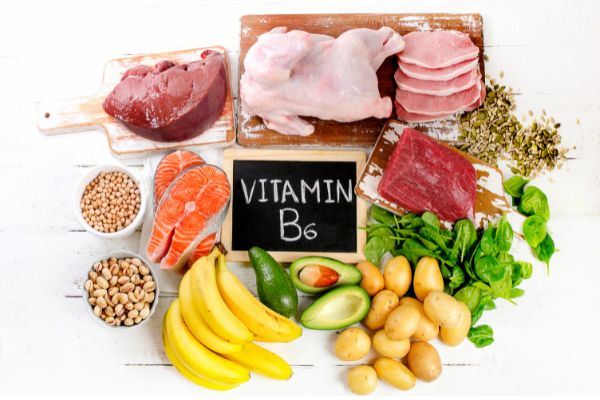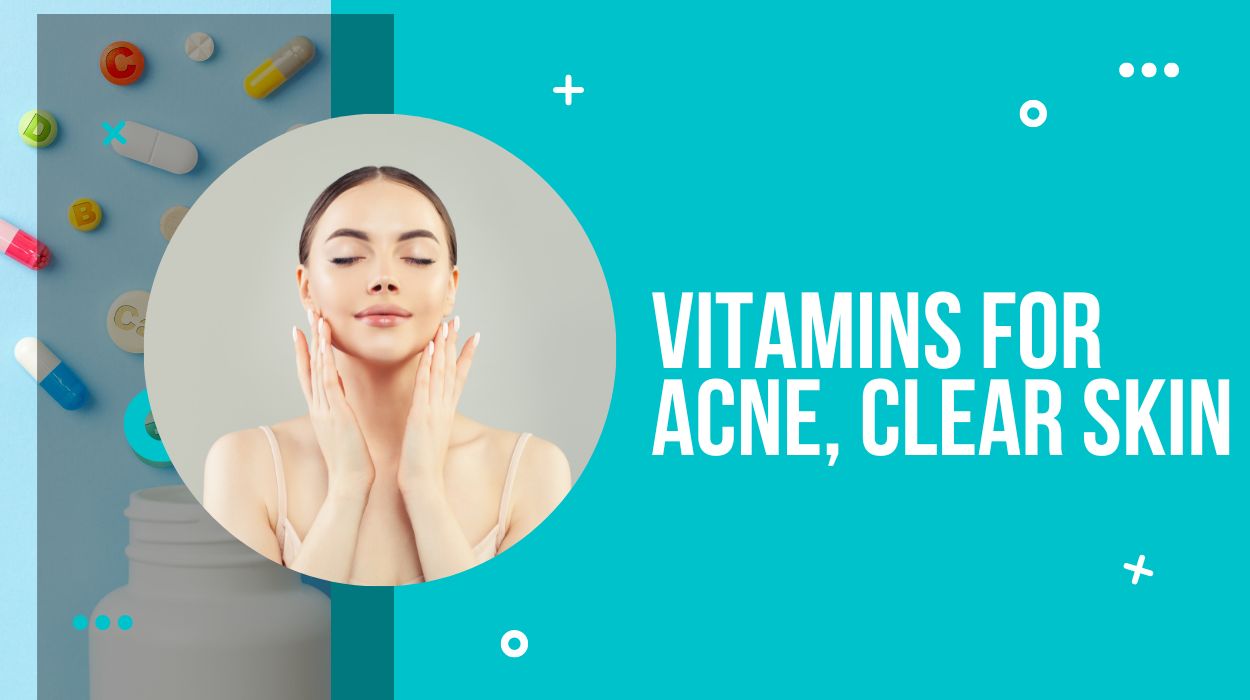Do you have acne? Have you tried different creams, lotions and medications? Acne is a common concern that has affected people of different ages. Acne probably makes you feel like you are the only one with this skin disorder.
Sometimes it is best to turn to vitamins for acne. Fortunately, there are several acne vitamins that you may take to help clean up and maintain your skin health. They can help to hydrate your skin and eliminate breakouts without harsh products.
In this article, let’s look at some of the best acne vitamins and how they can help you get clearer skin overall.
Vitamins – To Treat Acne

The proper diet is a vital part of acne treatment, supporting your skin and the inflammation that could contribute to pimples outbreaks. Diet alone won’t get rid of acne, but it can help reduce it by offering your body an array of vitamins and nutrients to support your overall health.
Vitamins are a very effective way of treating your acne because they help your body eliminate many toxins causing your skin to break out.
Read on to learn more about the vitamins that help clear up acne without causing further damage to your skin pores.
1. Vitamin A
Vitamin A is a vital nutrient for the human body. This substance is paramount in the treatment of acne and other skin issues. It works by preventing the bacteria from developing into an inflammatory state. This can be performed by preventing acne-causing bacteria from forming in the first place.
It is a water-soluble substance that aids in the maintenance of healthy and moist skin. It also has antioxidant properties that help fight free radicals, which can cause premature ageing, damage to cells, and even cancer.
Vitamin A is used to make skin retinoids, which are beneficial to the skin. They are used to treat acne, wrinkles, and other skin problems. However, Vitamin A is not a vitamin we produce naturally in our bodies, and it is only found in external sources such as food and supplements.
Sources:
- Red, green, and yellow leaf veggies.
- Yellow fruits like papaya, mango, etc.

Note:- Adult men should get 900 micrograms of Vit A daily, while adult women should get 700 mcg.
2. Vitamin B5
Vitamin B5 is a necessary nutrient that must be consumed regularly. It is necessary to maintain skin health, scalp, and nails.
It is a water-soluble substance that helps produce Coenzyme-A, an important molecule that plays a crucial role in all chemical reactions in the body. The primary function of Coenzyme-A is to help activate enzymes that are responsible for many chemical reactions in the body.
Vitamin B5 is crucial in the healing of acne. It has anti-inflammatory qualities and aids in the elimination of dead skin cells. It also has a substantial impact on creating collagen and elastin, necessary for producing healthy and elastic skin.
Sources
- Dairy products.
- White and sweet potatoes.

Note:- Vitamin B5 consumption is 5 mg per day for men and women aged 19 and up.
3. Vitamin B6
Vitamin B6 is a water-soluble essential nutrient necessary for skincare. It aids in maintaining skin moisture, which is crucial for acne patients.
Vitamin B6, or pyridoxine, helps boost red blood cell production and growth. By helping to build new cells, it works effectively to treat acne and reverses the damage that dead skin cells cause.
Vitamin B6 can help to clear your skin condition by reducing pore size, controlling sebum production and reducing inflammation so that blemishes don’t last as long on your skin.
To maintain an optimum balance between Vitamin B6 levels, consuming enough food rich in Vitamin B6 is essential.
Sources
- Soya beans.
- Pinto beans Oats.

Note:- Vitamin B-6 is 1.3 mg per day for persons 50 and under. After 50, the daily requirement dose for women is 1.5 mg and 1.7 milligrams for males.
4. Vitamin C
When it comes to battling acne and ageing skin, there are a lot of valuable nutrients you can use to address both issues. Vitamin C is crucial for collagen synthesis, which helps to reduce the appearance of wrinkles.
To heal damaged skin and help prevent acne breakouts, vitamin C is also needed for repairing damaged skin cells. It can also prevent dryness caused by inadequate hydration.
It has an anti-inflammatory ability to help with acne recovery and lessen the redness and swelling. It fights bacteria that cause acne and can help to heal it with time. The most straightforward approach to getting enough vitamin C is to consume foods that have a lot of it.
Sources
- Citrus fruits.
- Leafy greens.
- Bell peppers.

Note:- Men should take 90 milligrams of vitamin C each day, while women should take 75 milligrams.
4. Vitamin D
Vitamin D is a necessary component of human wellness. When sunshine strikes the skin, the body produces vitamin D. People are exposed to sunlight from being outside the sun. This can emerge in acne and other skin concerns.
Vitamin D is an essential mineral for human health. It aids in maintaining skin health and has an essential function in the immune response. Vit D is a fat-soluble nutrient that helps the skin’s collagen and elastin production.
It also helps in lessening inflammation and other symptoms linked to acne. On the other hand, a lack of it can contribute to skin diseases like psoriasis and atopic dermatitis.
The body produces vitamin D spontaneously when the sunshine comes into contact with the skin. However, certain foods also contain vitamin D.
Sources
- Fatty fishes, such as – tuna and mackerel.
- Beef liver.
- Breakfast cereals.
- Fortified foods – such as milk, fruit juices, etc.

Note:- infants under 1 year should take 400 IUr, and people between 1 to 70 age should take 600 IU daily.
5. Vitamin E
Vitamin E is also a crucial nutrient for the body, essential for healing wounds and burns. It also assists in the preservation of skin smoothness and resistance to sunburn. It is among the most effective acne vitamins.
It is a highly effective anti-inflammatory, antioxidant and skin-lightening agent. It works as an acne treatment and helps to prevent new scratch marks from appearing.
It is required for skin cell development, renewal, and preservation of lines. It has also been shown to decrease acne scars by lowering inflammation and providing a youthful appearance.
Vitamin E can also treat premature ageing caused by sun damage or smoking. It has antioxidant capabilities that help to prevent damage caused by free radicals.
Sources
- Green veggies.
- Vegetable oils.

Note:- Vitamin E is advised as a daily intake of 15 mg.
Acne prevention tips:
Pimples can be painful and embarrassing. Because there aren’t many quick remedies for them, you’ll have to stick with these tips. It will take a couple of weeks, but the results will be worthwhile.
- Avoid wearing apparel that restricts your skin’s ability to breathe.
- Gently cleansing the skin to eliminate excess oil and dead skin cells.
- Showering after exercise or sweating since perspiration can block pores.
- You should not touch your face frequently and pop pimples.
- You should avoid the use of hair oil.
Frequently asked questions:
Question 1:- How long would the vitamins take to kick in?
Answer:- It is essential to bear in mind that the time it takes to take effect differs from person to person. The efficacy of a vitamin or nutrient is influenced by various variables, including age, gender, metabolism, and medical conditions.
Question 2:- How often should you have vitamins to treat acne?
Answer:- The skin is prone to various kinds of skin disease. This might result in pimples and other skin issues. To treat acne, you should have vitamins every day to prevent it from getting worse until the results appear.
Question 3:- Are food-based vitamins better than supplement-based vitamins?
Answer:- Vitamins are among the essential dietary components for optimum health. Food-based vitamins are preferable to supplement-based vitamins since they assimilate quicker in the body and give more nutrients from the diet.
Wrapping Up
Acne may be a common problem, but it doesn’t need to lead to painful acne scarring and embarrassing breakouts. As you’ve seen, there are several vitamins for acne that may help you cleanse your skin and maintain your youthful appearance. These vitamins are easy to take and cost far less than doctor-prescribed or over-the-counter medications.
And as long as you stick with the right vitamins for your skin condition and aren’t afraid to try new treatments, you can reduce or eliminate these embarrassing problems.


